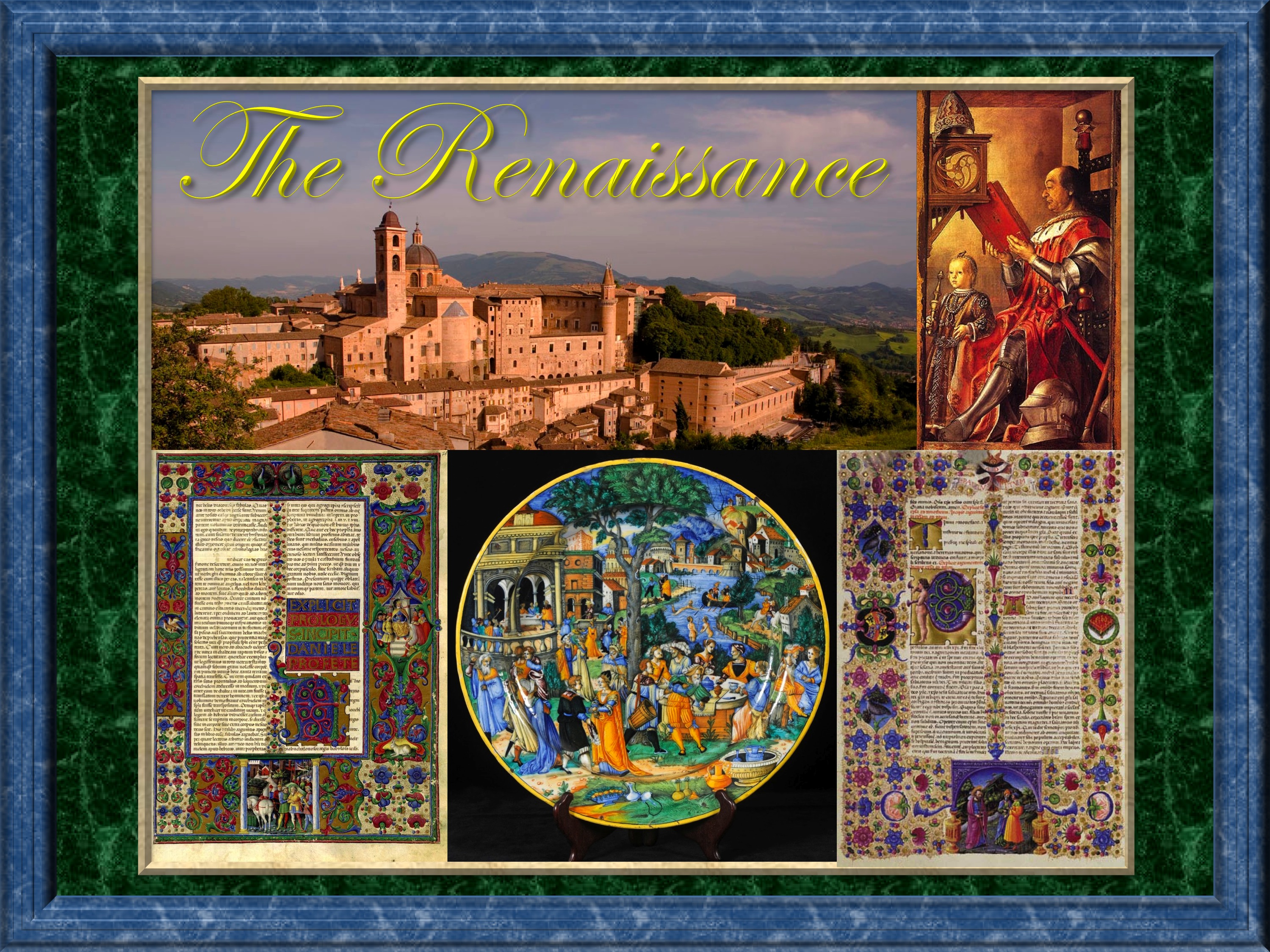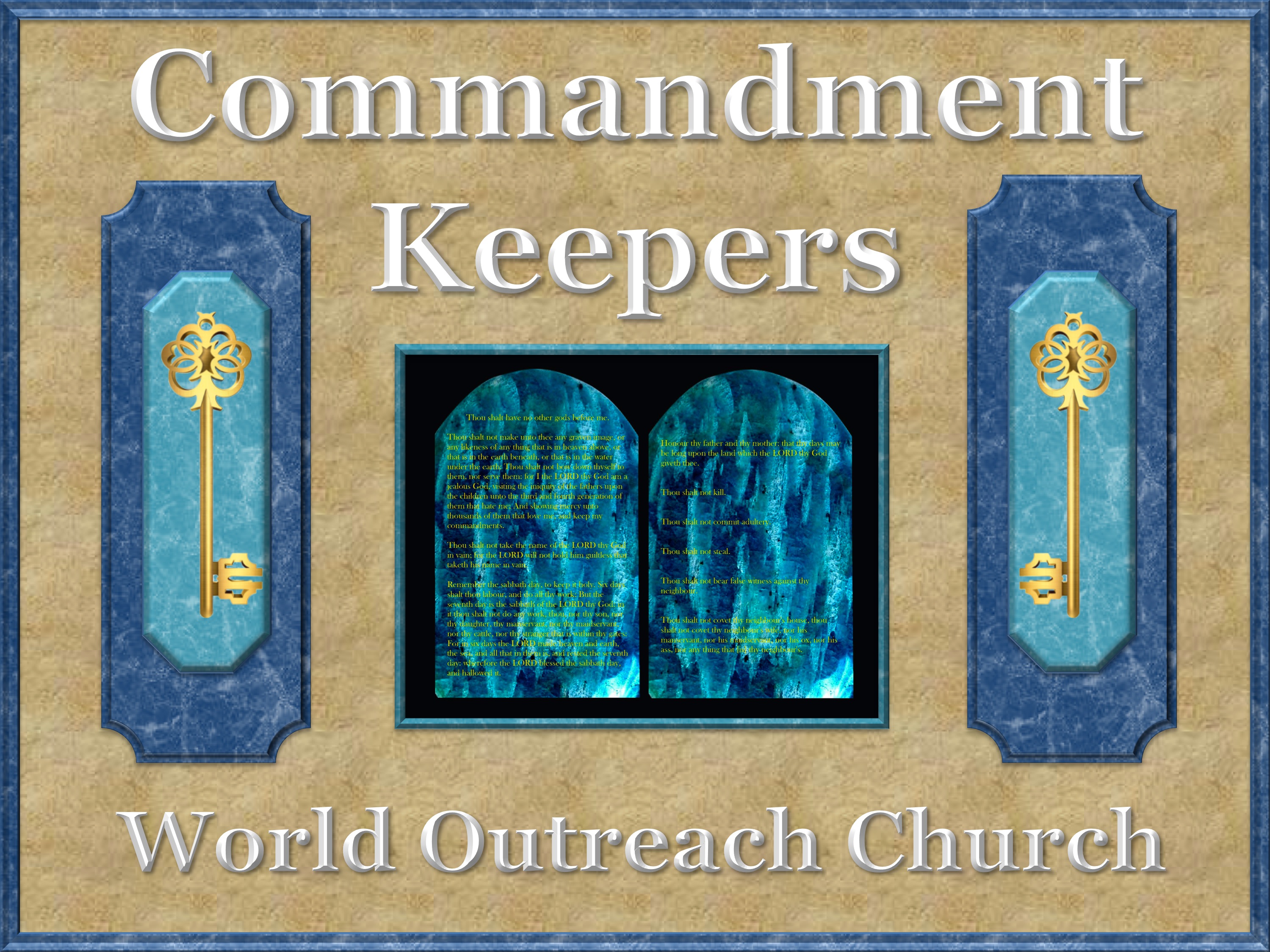 The "Renaissance"
And The Urbino Bible
"Renaissance"
literally means "rebirth." It refers especially to the rebirth of learning that began in Italy in the fourteenth
century, spreading to the north, including England by the sixteenth century, and ended in the far north in the mid-seventeenth century.
During this period, there was a deep yearning to learn that had been so long denied through Rome’s authority. An enormous
renewal of interest in and study of classical antiquity now stood on the throne of human desire. Simply put, it was the restoration
of Greek culture in education, medicine and science that prompted this movement. Rome had so long strangled true education
that when travelers and merchants came from the East sharing vignettes of the vast knowledge that was available, a spark ignited
the human thirst for knowledge and to understand the laws of the Earth in which we live.
Yet the Renaissance was more than a "rebirth." It was also an age of renewed discoveries: exploring geographical,
intellectual, and spiritual knowledge. All kinds of discoveries resulted in tremendous reforms for Western civilization: an
impetus that would pave the way to the knowledge and freedom we enjoy in our day. In science, for example, Copernicus (1473-1543)
attempted to prove that the sun rather than the earth was at the center of the planetary system, thus radically altering the
cosmic world-view that had dominated both antiquity and the Middle Ages. In religion, Martin Luther (1483-1546) challenged
and ultimately caused the split from the major institution that had dominated Europe with an “iron” fist throughout
the Dark and Middle Ages—the Roman Catholic Church. In fact, Renaissance thinkers often thought of themselves as ushering
in the modern age, as distinct from the ancient and medieval eras dominated with religious threats and all the associated
crippling superstitions.
Our brief
study of the Renaissance centers on five interrelated issues. First, although Renaissance thinkers often tried to associate
themselves with classical antiquity and to dissociate themselves from the Middle Ages, valuable unchanging principles were
still influencing men’s thinking such as the belief in the ‘Great Chain of Being’ (Its premise being that
every existing thing in the universe had its "place" in a divinely planned hierarchical order, which was pictured
as a chain vertically extended). Second, during this period, significant religious/political changes were taking place: Rome
was progressively proven fraudulent as Christ’s servants. Third, the movement known as Humanism best expressed some
of the noblest ideals of the period. Fourth, and connected to Humanist ideals, was the literary doctrine of "imitation,"
important for its ideas about technology and how literary works should be created. Finally, what later became the most far-reaching
influence, both on literary creation and on modern life in general was the religious movement known as the Reformation.
Renaissance thinkers strongly associated themselves
with the values of classical antiquity, particularly as expressed in the newly rediscovered classics of literature, history,
and moral philosophy as the knowledge of the East increasingly flowed to the West. Also, they tended to dissociate themselves
from works written in the Middle Ages, (a historical period they looked upon with increasing disfavor and even disdain). According
to them, the Middle Ages were set in the "middle" of two much more valuable historical periods, antiquity and their
own. Nevertheless, as modern scholars have noted, long held traditions from the Middle Ages still pressed their authority
in the thinking.
During this exquisite
time of enlightenment came the Duke of Urbino: a man named Federico da Montefeltro. He lived in an age of betrayal, cut throat
religion, self-serving politics and price gouging businesses (quite similar to what we see today). The age in which he lived
called for his participation to these common and inhumane tactics, even for his own survival. But the Duke of Urbino would
not give in to this deplorable method of governance.
Federico da Montefeltro (1422-1482) was born to a noble family that ruled over an insignificant square of “the
chessboard” that was then central Italy. Yet within sixty years he had become “the light of Italy” and the
paradigm of Renaissance man, as skilled in letters as in arms. He made his money as one of the most successful condottiere
(or hired generals) of his time. Always fighting on short-term contracts and strictly for “cash on the nail,”
he displayed the ability to maintain his integrity to conscience, the discernment of right and wrong. Once he fought for Florence
against the Pope. But at another time took up the Papal banner against the Florentines.
His fortune made, he turned to the arts as enthusiastically as he had to war and settled down to create his shining
court. In the age when those who ruled the lives of men were constantly threatened, the Duke of Urbino was so loved by his
people that he moved about without any guard protection. His taxing of the people was minimal and he established standards
for their welfare and not for their poverty. In the morning he would judge the crimes and complaints of his people in his
garden, and give his decision in the afternoon. In fact, he set a standard of courteous behavior whose reputation spread so
quickly that it became the norm throughout Europe, and thus, contributing to his legacy as “the light of Italy.”
Nearly all the great names of the age passed through his palace, and his library, which was reckoned among the largest in
Europe. The “Quattrocento” (The cultural and artistic events of 15th century Italy) was the springboard for much
of the reformation in Europe.
In addition
to his contribution as a “peacemaker” his legacy includes one of the most visually beautiful Bibles ever scribed.
Adorned with miniature art scenes accompanying each story throughout its pages the Urbino Bible (1476-1478) was scribed from
the Latin Vulgate of Jerome. And although the text used is inferior to the "Received Text" of the King James Bible,
the honor that the Duke of Urbino placed on the printing of the Word of GOD has never been surpassed, before or since.
|
 Commandment
Keepers invites every Christian to join the closing work of the Gospel of Jesus Christ and establish twelve member groups
within your respective country, heralding the titles: Commandment Keepers Kenyan Assembly, British Assemby,
Brazilian Assembly, etc. As the Bible teaches, the redeemed of earth will come from "every nation, and kindred,
and tongue, and people." Rev.14:6. And all will have stood faithful to Christ's Words, "But if thou wilt
enter into life, keep the commandments." Matt.19:17.
To meet the specific cultural
needs of the different peoples of the world, a custom tailored witness is vital for successful evangelism. While the
message of Salvation through the Creator/Christ is universal in its scope, people's cultural affections vary greatly from
land to land. What can bring tears of joy to one group can actually harden the hearts of another.
To receive this ministry outline click "The Evangelists" below. It contains all the materials needed to succeed
in this invaluable type of ministry.
Two reasons for the need of small church
companies at this time in history:
1. There are six branch ministries, which cover all areas of the closing gospel
work, providing each member with an invaluable task. Teamed up in pairs for each of the branch ministries, none
will sit on the sidelines, feeling useless, and where each have equal value to the success of the ministry's
work.
2. Economic streamlining has become an essential factor in the closing work. As America
and other countries proceed in their place in Bible prophecy a structure of ministry must be in place to carry out
the Savior's closing work on the minds and hearts of the people just at the time it is needed the most.
This efficient, low cost approach to the closing work will be lavished with
GOD'S blessing. Each of these small church companies will be given an eloquent, persuasive testimony
by GOD: to share in the most privileged work on Earth: enlightening the world with His Glory: His redeeming love found in
the truth, as the truth is in Jesus:" as Creator of heaven and earth; what He has done: as
bearing the punishment for the sins of men; and what He is doing: interceding on behalf of His faithful children who are continuously
accused of the devil; and what He will do: deliver His faithful children when He comes again.
Through His Presence, Guidance and Intervention, the faith of Bible literate and obedient Christians will swell
to a lofty summit, preparing them for the coming of the LORD.
Lastly,
no tithe is required except to budget your ministry's needs.
Liberty Seminars: Bible Prophecy: Your Key To The Future
Our Home Church Welcomes All
Author's Faith Biography
Core Beliefs
Commandment Keepers 2116 Linden Highway Hohenwald, TN 38462
|
|

